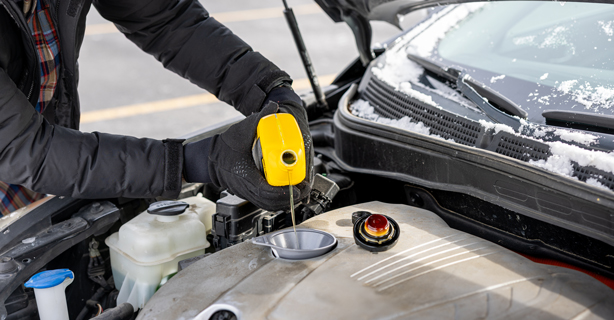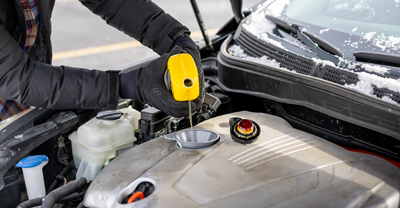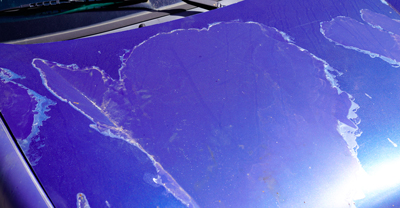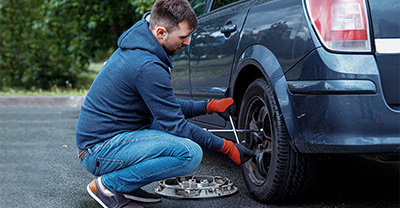How to change your car's oil: A simple step-by-step guide


0 min. read
Tired of paying a mechanic to change your oil? One of the best ways to start learning about your vehicle is to get under the hood! Read on for supplies, step-by-step instructions, common mistakes, and the benefits of changing your own oil.
Oil change preparations
Before you start a DIY oil change, review the supplies checklist below along with your vehicle’s owner or service manual. Gather all the necessary supplies ahead of time so you can avoid mid-project trips to the store.
Essential supplies checklist

Protective sheeting or cardboard

Wheel chock blocks

Floor jack and two jack stands

Basic ratchet and socket set

Oil drain pan

Rubber gloves

Safety glasses

Clean rags

New oil filter appropriate for your make and model

Oil filter wrench

Clean funnel

Conventional, blended, or synthetic oil (check your car's manual for the correct type, amount, and viscosity)
Setting up your oil change workspace
Preparing your workspace is all about safety and getting the job done right. Set yourself up for success with these tips:
Park on a level surface that can safely support your vehicle
Ensure you have enough room to move around freely
Work in a well-lit spot
Clear your work area of any dirt or debris
Protect your work surface from spills or stains with a tarp or large piece of cardboard
DIY oil change: Step-by-step process
Ready to get your hands dirty? This step-by-step guide walks you through the entire DIY oil change process, from prepping your car to disposing of the used oil.
Warm-up and preparation
Start with a warm—not hot—engine. Wait 30 minutes to allow the engine to cool down to a safe working temperature while still retaining enough warmth for good oil flow.
Engage the parking brake and/or insert chock blocks behind the rear wheels to prevent the vehicle from rolling.
Before lifting your car, check the minimum and maximum height restrictions of your jack stands. If your vehicle has a high clearance and you can safely reach the drain plug and oil filter without jack stands, you can skip the next step.
Use a floor jack to raise the front end of the vehicle, one side at a time, before placing a stand under each jack point—a reinforced metal area designed for securely jacking up the vehicle. Raise the vehicle high enough to work comfortably.
Remove any covers or shields from the vehicle undercarriage that are blocking access to the drain plug.
Position your oil drain pan under the plug.
Draining the old oil
Put on personal protective equipment like rubber gloves and safety glasses.
Locate the oil pan and drain plug under the vehicle. Carefully remove the oil drain plug, making sure to keep track of the washer.
Allow the oil to drain completely, usually for at least 10–15 minutes.
Inspect the oil for metal particles or unusual debris that might signal engine problems.
Clean the drain plug thoroughly with a clean rag and inspect the washer. Replace the washer if it shows any wear.
Replace and tighten the drain plug until it’s hand tight, then another quarter turn. Ensure the threads are lined up correctly so it seals completely, but don’t overtighten it.
Changing the oil filter
Reposition the oil pan directly under the filter to catch dripping oil.
Use a filter wrench to remove the old oil filter.
Inspect the filter mounting surface to ensure the old gasket has been removed. Clean the surface with a clean rag.
Open the new filter and apply a thin film of new oil to the rubber gasket.
Screw on the new filter by hand until the gasket meets the mounting surface.
Tighten the filter another quarter turn with the filter wrench. Don’t overtighten it.
Adding fresh oil
Locate and remove the oil fill cap under the hood of your vehicle.
Slowly add new oil through the fill hole with a funnel.
Replace the oil fill cap.
Start your engine and let it run for one minute.
Check for leaks under the vehicle.
Lower your vehicle to level ground if you don’t see any leaks.
Remove and wipe the dipstick, then check the oil level.
Proper oil disposal
Never pour used oil down the drain or on the ground—it's harmful to the environment. Most auto parts stores and many mechanic shops will accept used motor oil for recycling, even in small quantities. Search online for "used oil recycling near me" or call your local auto parts stores to confirm.
Once the used oil has cooled completely, carefully pour it into a sealed metal container (a used oil container or even an empty coolant jug with a tight seal works well). Transport the container carefully to the recycling center.

Learn more about DIY oil changes
Now that you've gone through changing your oil step by step, it's important to learn about ongoing maintenance and avoid common mistakes. A well-maintained engine runs more efficiently and lasts longer. Here’s what you need to know to keep your car in top shape when you’re doing your own oil changes.
Oil change maintenance schedule
Regular oil changes are essential for keeping your engine running—but how often should you change the oil in your car? If you wait too long, your engine can seize up when it tries to run with inadequate or dirty lubrication, which can lead to costly repairs.
If your car was made in 2018 or later and uses synthetic oil, you can go longer between oil changes than older vehicles. The old “three months or every 3,000 miles” rule is now outdated for modern cars. Many manufacturers recommend oil changes every 5,000 to 7,000 miles. Your owner’s manual will give you the ideal schedule and oil type.
Some driving behaviors and conditions can make engine oil break down more quickly, which means you’ll need an oil change sooner:
Frequent, short trips
Aggressive driving
Extremely hot temperatures
Avoid these common oil change mistakes
Even if you've followed all the steps, a few common mistakes can lead to engine trouble. Keep these in mind to make sure your oil change is a success.
Using the wrong oil type or amount: Always check your manual twice—both for the correct oil type and quantity. Using the wrong viscosity or not adding enough oil can cause serious engine damage.
Forgetting to remove the old filter gasket: A double-stacked gasket could cause leaks and potentially catastrophic oil loss while driving.
Overtightening the oil filter or drain plug: This can strip threads or crush gaskets which can lead to leaks.
Neglecting to replace the drain plug washer: A worn or deformed washer can cause slow leaks over time.
Not checking for leaks before driving: Run the engine briefly and inspect for any signs of dripping oil.
Disposing of used oil incorrectly: Take used oil to a recycling center or an auto parts store—most accept it for free.
Troubleshooting common oil change issues
If something seems off after your oil change, here’s how to troubleshoot common problems:
Stripped drain plug: You can purchase a kit to re-thread the drain plug or contact a professional for help.
Oil leak: Wipe all connections with a clean cloth and watch for the source of the leak. Double check for loose connections or worn gaskets.
Unusual engine noises: Turn off the engine and check your oil level. Low oil could indicate a leak. If the level is fine but noises persist, consult a professional.
Oil change FAQs: Your top questions answered
Got questions? You're not alone!
Q: Do I really need to wear safety glasses during an oil change?
A: Yes! Hot oil and other contaminants can splash unexpectedly, even when you're being careful. Safety glasses protect your eyes throughout the entire process.
Q: What happens if I lose my oil cap
A: You should never drive without a properly fitted oil cap. The oil cap helps maintain the correct pressure in the engine, keeps dirt and debris—which can damage the engine—out of your oil, and stops oil from splashing around your car's engine compartment. Get a replacement immediately from your auto parts store.
Q: How do I know if water or other contaminants got into my oil?
A: Check your dipstick for milky-looking oil or water droplets. Dirty oil can also cause a viscus buildup under your oil cap that resembles mayonnaise. If you see either of these signs, consult a professional.
Q: I'm just getting started with car maintenance, should I attempt my own oil change?
A: If you're nervous, have an experienced friend guide you through your first one. Many auto parts stores offer free basic maintenance workshops to help you learn.
Q: How long should I wait to check the oil level after adding new oil?
A: Give it 5–10 minutes after shutting off the engine. This lets the oil settle in the pan for an accurate dipstick reading.
Q: Are ramps better than jack stands for oil changes?
A: Both ramps and jack stands have their place. Ramps are often easier for beginners since there's no lifting involved, but make sure they're rated for your vehicle's weight and always use wheel chocks. Some pros prefer jack stands because they offer more working room underneath, but they require proper jack points and careful placement.

The general information in this blog is for informational or entertainment purposes only. View our blog disclaimer.










